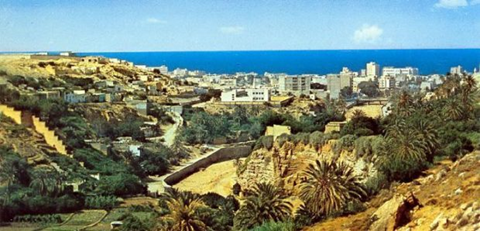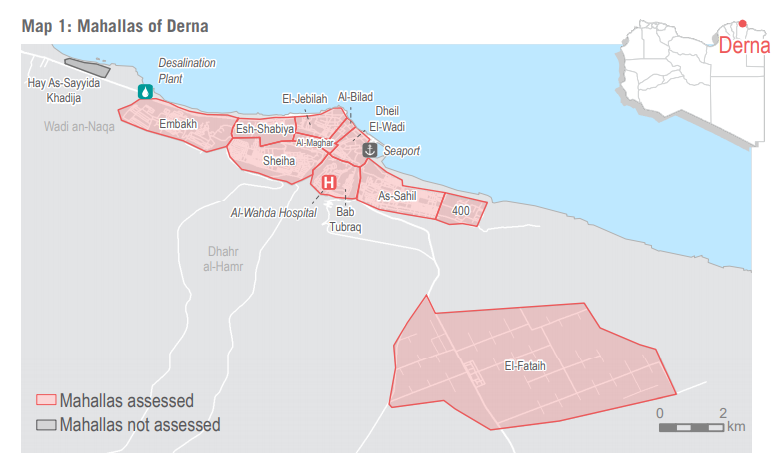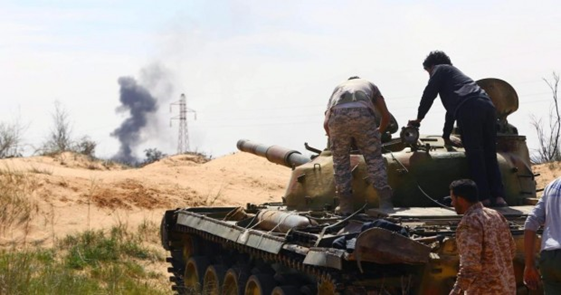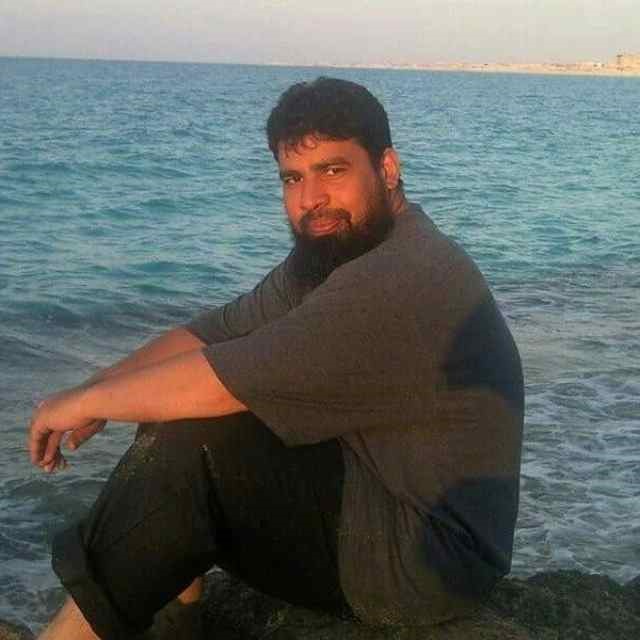June 29, 2018
 The Southern Approach to Derna (Libyan Express)
The Southern Approach to Derna (Libyan Express)
Once an important Mediterranean port in the ancient world of the Greeks and Romans, the city of Derna is currently being leveled by artillery and airstrikes supporting a ground offensive led by 76-year-old “Field Marshal” Khalifa Haftar. A former Qaddafi loyalist, veteran of Libya’s disastrous war in Chad and a one-time CIA asset, Haftar now seeks total control of Libya while acting as the commander of the so-called “Libyan National Army (LNA),” nominally the military wing of the Tobruk-based House of Representatives (HoR), a rival government to the internationally recognized Presidency Council/Government of National Accord (PC/GNA) in Tripoli. The LNA is a coalition of former revolutionaries, Saudi-influenced Islamist militias and occasionally mercenaries who fight under Haftar’s direction.
More recently known as a hotbed of jihadist activity, Derna plays an important part in U.S. military history; in 1805 Consul William Eaton led seven U.S. Marines and several hundred Greek, Arab and Turkish mercenaries on a five hundred mile march from Alexandria to Derna, where his odd little army took the city from a larger Karamanli force in little more than an hour. It was the young republic’s first over-seas land battle and a notable success after the French had failed to take Derna five years earlier.
Today, however, Derna has become known as a hotbed of jihadist activity. Haftar’s campaign aims to bring an end to that, but the longer the LNA bombardment continues the less certain his political future becomes.
Derna and the Islamic State
Located on the coast near the green hills of the northeastern Jabal Akhdar region, Derna supplied over 50 fighters for the anti-American jihad in Iraq in the 2000s. In October 2014, a group of Islamist militants based in Derna (particularly dissident members of the Abu Salim Martyr’s Brigade) pledged allegiance to the Islamic State (IS) organization and took over many parts of the city despite the opposition of other Islamists with close ties to al-Qaeda. IS rule was marked largely by beheadings and other forms of public humiliations and executions.
Fighters opposing the IS within Derna formed the Majlis Shura al-Mujahideen Derna (Derna Mujahideen Shura Council – DMSC) on December 12, 2014. This group began to drive IS militants out of Derna in June 2015 even as the LNA imposed a loose siege on the city. The DMSC fought a merciless war against IS members responsible for murders and suicide bombings in Derna, frequently executing IS militants after obtaining their confessions (Libya Express, March 22, 2016).
In the meantime, the IS slaughter of 21 Egyptian Coptic Christians in Sirte in February 2015 led to Egyptian airstrikes on IS strongholds in Libya, including DMSC targets in Derna. The DMSC declared they had “no relation with the IS in Syria and Iraq,” adding that they also had nothing to do with the IS beheadings of Egyptian Copts hundreds of kilometers away (Middle East Eye, February 19, 2015). Later that year an American F-15 airstrike killed IS commander Abu Nabil al-Anbari (a.k.a. Wissam Najm ‘Abd Zayd al-Zubaydi; a.k.a. Abu Mughira al-Qahtani) just outside Derna (BBC, December 7, 2015).
 Neighborhoods of Derna (NGO Reach)
Neighborhoods of Derna (NGO Reach)
For a time the IS fugitives were able to establish themselves in the industrial suburb of al-Fatayih, but were eventually forced from there in April 2016, bringing the DMSC’s two-year campaign to an end (Libyan Express, April 20, 2016). Four days later the DMSC complained that since the IS expulsion Haftar’s small air force had mounted 12 airstrikes on civilian neighborhoods of Derna while failing to attack fleeing IS fighters who were dangerously exposed in open country (Libyan Express, April 24, 2016).
The Egyptian air force bombed Derna again in May 2017 as retaliation for an attack on Christians in central Egypt that was blamed on IS militants from Derna (BBC, May 26, 2017). The DMSC denied any involvement in the mass-killing, reminding Cairo that the IS had been expelled from Derna, while suggesting the accusation was an attempt to divert attention from the Egyptian government’s inability to tackle its own security crisis (Libyan Express, May 28, 2017). The LNA’s two-year-old siege of Derna was tightened in August, with residents describing it as “collective punishment” (Middle East Eye, August 7, 2017).
The Field Marshal
Inaccurate reports of Haftar’s imminent death in April after a medical evacuation to Amman and then Paris may have sparked a succession struggle within the LNA, possibly including the April 18 car bomb attack on Haftar’s LNA chief-of-staff, General ‘Abd al-Razik al-Nazuri (218 TV [Libya], via BBC Monitoring, April 18).
Haftar’s bid for power is supported by Russia, France, Egypt and the United Arab Emirates (UAE), which has been accused by the UN of providing military helicopters and other aircraft to Haftar’s LNA in violation of the UN arms embargo. There are also reports of Haftar seeking military support from Israel (The New Arab, July 27, 2017; Libyan Express, December 25, 2017; Middle East Eye, August 5, 2017),
Charges related to alleged LNA war crimes have been filed in France, the U.S. and the International Criminal Court (ICC) (Libya Observer, May 2). Haftar has refused to turn suspected war criminals in the LNA ranks over to the International Criminal Court (ICC), and has even been charged with torture and murder himself in Paris (Middle East Confidential, May 3).
The Offensive Begins
As the LNA began to occupy the southern heights overlooking Derna in the third week of April, the DMSC appealed for reconciliation, extending “Its hand in peace” and declaring its members were “ready to be accountable for any injustices we are proven to have committed.” Oddly, the group suggested mediation through the offices of former Libya Grand Mufti Shaykh Sadiq al-Ghariani, one of Haftar’s most bitter and vocal opponents (Libyan Social Media, via BBC Monitoring, April 22). Instead, the seizure of the heights allowed LNA artillery spotters to direct more intensive fire onto targets within Derna.
 Fighting on the Outskirts of Derna (Libyan Express)
Fighting on the Outskirts of Derna (Libyan Express)
On May 7, Haftar announced a final offensive to “liberate” Derna, even if “we have to evacuate all civilians from it” (Libyan Observer, May 7). A member of the Presidential Council, Muhammad Amari Zayid, described the offensive as a “war crime” that was being carried out to satisfy “personal ambitions” rather than serve the interests of the nation (Libya Observer, May 8). Zayid succeeded in meeting with the head of the Derna local council, who confirmed that Derna’s civil and military institutions were affiliated with the PC/GNA (Asharq al-Awsat, May 10).
On May 11, the DMSC reorganized as the Derna Protection Force (DPF), possibly to build a common cause with less religiously-driven fighters who nonetheless oppose Haftar and the imposition of his own form of strongman rule across eastern Libya. Some members of the DPF were formerly aligned with Ansar al-Shari’a, an Islamist militia close to al-Qaeda that dissolved in May 2017 after suffering heavy losses in fighting with the LNA and its allies (Reuters, May 27, 2017). By May 15, LNA attacks had begun to strike civilian areas of Derna. Social media photos displayed indiscriminate bombing of civilian areas of Derna’a Wasat al-Bilad district, with local sources saying bodies (including those of women and children) could not be recovered due to shelling and airstrikes (Libya Observer, June 9).
Worried residents of Derna were not reassured by a video released by an LNA fighter in which the speaker warned they would be treated worse than the “Khawarij” (a derogatory reference to the Kharijites, a violent and despised extremist sect in early Islam); “We will demolish your houses; we will kill everyone, even civilians, we don’t need Derna anymore” (Libya Observer, May 17). This was followed by an announcement from Haftar’s “Information and Fighting E-Terrorism Unit” that they had a list of 21,000 “terrorists” they were seeking in the city of 125 to 150,000 people (Libya Observer, May 27).
A veteran Egyptian jihadist and qadi (religious judge), ‘Umar Rifa’i Juma’a Surur (a.k.a. Abu ‘Abdallah al-Masri), was killed in a May 21 airstrike on Derna, according to an LNA spokesman (Al-Wasat [Cairo], May 21; Al-Sharq al-Awsat, June 11). Surur was alleged to have acted as a recruiter of jihadis headed for Syria, Iraq and Egypt (Egypt Today, May 21). Known for his strong opposition to the rival Islamic State, Surur was formerly a lieutenant of Egyptian jihadist Hisham ‘Ali al-Ashmawy, an expert in tactics and weapons (Al-Arabiya, June 10). Two other militant clerics, Abu Zayd al-Shilwi and Abu ‘Umar ‘Abd al-Salam al-Awami, were killed the same day (Telegram Messaging via BBC Monitoring, June 11). The LNA also suffered losses; On May 22, the LNA announced the death in combat of 36th Brigade commander Brigadier ‘Abd al-Hamid Warfali during clashes southwest of Derna (Libya Observer, May 23).
Nonetheless, Haftar announced on May 24 that the end of “four consecutive years of holy struggle” was approaching in Derna, while proclaiming he had ordered his men not to “harm the city’s residents or their property” (Middle East Monitor, May 24). The LNA commander also called on the families of DPF fighters to pressure their kinsmen to abandon arms in the struggle against the LNA and seek the “fair trial” being offered (Reuters, May 25).
Egyptian airstrikes coordinated with the LNA struck central Derna and the Fatayeh industrial zone on May 26, 2017, followed by claims to have destroyed the DPF headquarters (Libyan Express, May 27, 2017; Middle East Eye, May 29). Drone attacks and heavy shelling forced the DPF to withdraw from al-Fatayeh on May 29 even as Derna’s local council issued an appeal to all local, regional and international organizations to open Derna’s port for humanitarian assistance, describing conditions as “disastrous” (Anadolou Agency, May 28; Libya Observer, May 29).
The LNA Enters Derna
By June 1, the LNA claimed to have taken al-Fatayih and the heights overlooking the Bab al-Tobruk district of Derna (Middle East Eye, June 1). Shaykh Sadiq al-Ghariani took to Libyan TV to describe the attack during the holy month of Ramadan as “preposterous.” Urging all Libyans to support the citizens of Derna with civil disobedience if necessary, al-Ghariani declared that “What is happening in Derna is not a war on terrorism, but a war on all Libyans in order to subdue them” (Tanasuh TV, via Libya Observer, June 2).
The attacking force consisted of four battalions of LNA troops, with two battalions working their way into Derna from the west and two from the east, beginning on June 4. Troop movement is directed by the ‘Umar Mukhtar Operations Room under the command of Major General Salim al-Rafadi. The troops are strengthened by elements of the al-Sa’iqa Special Forces brigade and supported by artillery and warplanes belonging to the LNA, Egypt and the UAE (The National [Abu Dhabi], June 5). France, which aided Haftar in his three-year siege of Benghazi, is reported to have secretly provided Haftar with a newly-obtained Beechcraft King Air 350 reconnaissance airplane for work over Derna (Libya Observer, June 3; Libyan Express, November 1, 2016). Publically, France is promoting a peace process intended to lead to presidential and parliamentary elections in December.
At the forefront of the LNA offensive is Wanis Bukhamada’s Sa’iqa Special Forces. Bukhamada insists his unit is “fighting members of terrorist groups operating under a variety of names… Libyan fighters… must resolve their issues with the Libyan state through the courts… As for foreign fighters, they have no place in Libya…” (Al-Wasat via BBC Monitoring, May 20). LNA forces captured Derna’s security chief, Yahya Usta ‘Umar, on June 8. Though appointed by the GNA, Haftar’s representatives described ‘Umar as an al-Qaeda-affiliated terrorist (Libyan Express, June 8).
With the LNA having developed a reputation for the mistreatment and even murder of prisoners, Haftar announced he had asked his troops to “respect legal procedures relating to prisoners” during the battle for Derna (AFP, June 5). By June 8, the LNA claimed to control of 75% of the city, with Haftar setting the final stage of the conflict in religious terms during a speech to his troops: “After four years of holy struggle against the Kharijites, we are close to the liberation of Derna” (Egypt Today, June 8).
By June 12, the LNA claimed to control the port and all the rest of the city save for an inner core of some 10 km², where fighting was described as “very heavy” with LNA losses due to desperate DPF suicide attacks (Middle East Monitor, June 12; Libya Herald, June 12). Mines and IEDs have taken the largest toll on LNA attackers.
LNA Brigadier General ‘Abd al-Salam al-Hassi insisted that LNA forces would protect the lives and property of Derna’s civilian population, though reports from inside Derna described civilian deaths under bombardment and an inability to retrieve victims under constant fire (Libya Herald, June 6; Libyan Express, June 7). Another LNA official dismissed reports of Egyptian troops participating in the assault on Derna as an attempt by the Muslim Brotherhood to diminish the significance of the LNA’s impending victory, though he did acknowledge “high-level coordination and cooperation” with Egyptian officials (Asharq al-Awsat, June 10).
A report by Swiss-based NGO Reach detailed extensive damage from the siege to Derna’s roads and its water, electric and sewage systems. Schools, mosques and bridges have been bombed and those attempting to escape the destruction faced harassment or violence at checkpoints if they managed to get through networks of mines and snipers. [1] Shortages of food and medicine have been exacerbated by daily shelling and airstrikes while access to water and electricity remains intermittent at best.
Conclusion
It is likely that Haftar’s decision to turn away from his march on Tripoli to consolidate his rear in Cyrenaïca was strongly influenced by his supporters in Egypt, France and the UAE, all of whom regard Derna as a dangerous spawning ground for Islamist militants.
As the battle for Derna rages on, the international community looks away, having no particular objection to the elimination of this long-time Islamist hotbed despite the similarity of Haftar’s tactics to those used by Mu’ammar Qaddafi in 2011. This time, there is no imposition of a “no-fly zone” or mobilization of the international community. Italy has stated its readiness to supply humanitarian aid if “access is granted by the parties involved,” but this and a call for restraint from the UN Security Council constitute nearly the whole of international concern for the residents of Derna (Libya Observer, June 2). While the LNA claims to be working towards supplying “liberated” areas of Derna, other observers warn of an impending “humanitarian catastrophe” as the fighting continues (Middle East Eye, June 12). As the LNA commander is fond of referring to all his political opponents as “terrorists,” the question is whether the license given to him by the international community in Derna will apply to future attacks on Tripoli and other centers of anti-Haftar resistance.
It took three years for Haftar to take Benghazi, with repeated proclamations of victory routinely followed by reports of continued resistance. DPF fighters show little sign they are about to capitulate; rather than being “hours” away from total victory, as the LNA claimed on June 11, an extended period of urban warfare punctuated by deadly suicide attacks seems more likely. There is also a danger that the lightly-disciplined LNA fighters may commit abuses over time that could generate international disapproval. If this happens, it will have a serious impact on Haftar’s ability to bring western Libya under his control before the elections scheduled for December. For Haftar, a quick victory is essential – prolonged civilian suffering combined with the brutal realities of urban combat and a perceived inability to secure Derna could easily damage the aging Field Marshal’s political prospects and standing in the international community.
NOTE
- “Libya: Public services break down as conflict escalates in encircled city of Derna,” Reach, Geneva, June 5, 2018, http://www.reachresourcecentre.info/system/files/resource-documents/reach_lby_situationoverview_ra_derna_jun2018_0.pdf
This article first appeared in the June 29, 2018 issue of the Jamestown Foundation’s Terrorism Monitor.


